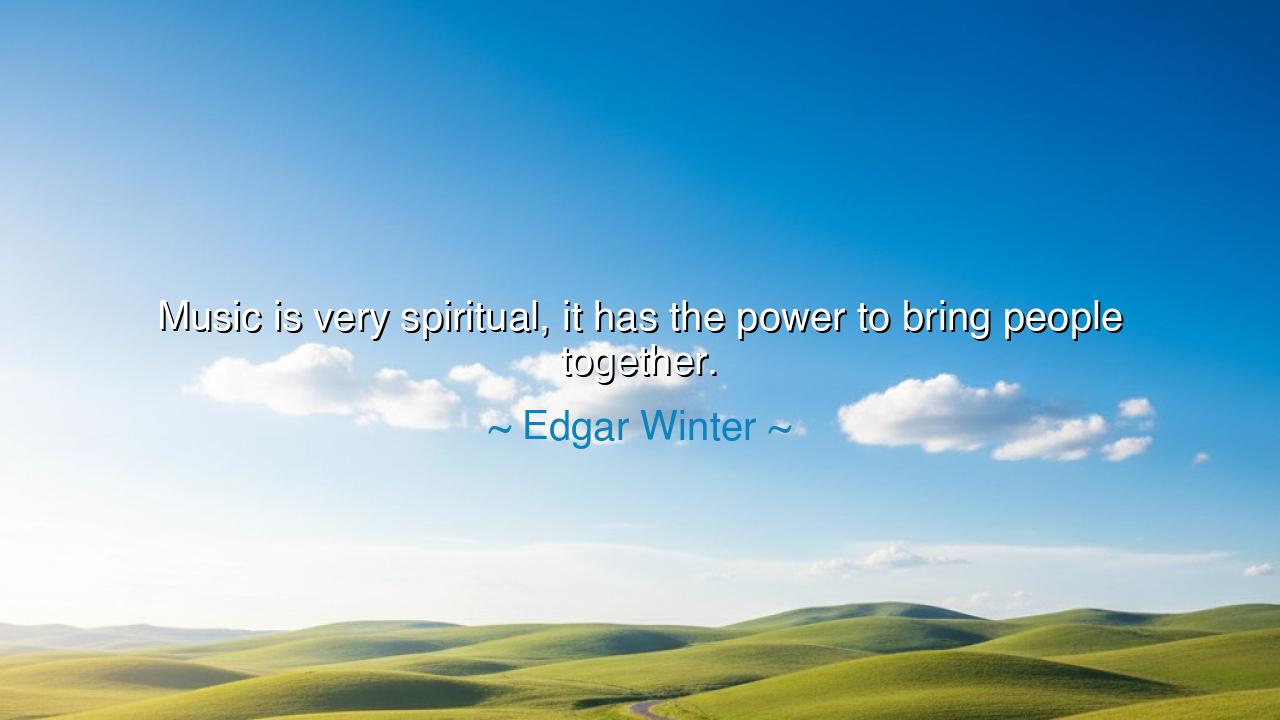
Music is very spiritual, it has the power to bring people






The words of Edgar Winter, “Music is very spiritual, it has the power to bring people together,” are a hymn to one of humanity’s oldest truths. Long before men built cities, they lifted their voices to the heavens and struck rhythms upon hollowed wood and stretched skin. Winter’s saying reminds us that music is not merely sound, but a bridge between souls, a river flowing from the unseen realm into the hearts of all who hear. It is a force beyond language, beyond borders, beyond even reason itself.
To call music “spiritual” is to recognize that it touches the deepest layers of our being. Words alone may persuade or explain, but music bypasses the mind and enters directly into the spirit. It stirs memory, awakens longing, and heals wounds unseen. A single melody can raise courage in the weary or soften hatred in the hardened. It is why the ancients used chants in their temples, why warriors marched to drums, why mothers still sing to their children in the quiet of night. Music carries what speech cannot bear.
Winter declares also that music has the power to bring people together. This is no mere metaphor; history bears it out. When nations are divided, songs often become the common ground. Recall the story of the Christmas Truce of 1914, when weary soldiers of warring sides in World War I heard carols drifting across no-man’s-land. Enemies laid down arms and for one night sang the same songs beneath the same stars. For a fleeting moment, the power of music overcame the power of war. Here was Winter’s truth, lived out in the mud of the battlefield.
And yet, music’s unifying power is not found only in war and peace, but in the daily life of humankind. Festivals, weddings, marches, and even funerals are bound together by song. Consider the freedom songs of the Civil Rights Movement in America. Simple hymns, sung in unison, gave strength to those who faced fire hoses and prison cells. These songs welded individuals into one voice, one heartbeat, one body. They did not merely comfort; they united and empowered. Thus, music became both shield and sword, a spiritual force of resistance and hope.
But beware: the lesson is not that music alone heals or unites without effort. Its power is unlocked only when hearts are willing to listen. A song may be played, but if ears are closed and spirits hardened, it becomes noise. The unity of music requires humility—the willingness to feel, to be moved, and to recognize in the sound of another’s voice the reflection of one’s own humanity. In this way, Winter’s words remind us that music is not only a gift, but also a responsibility.
For those who hear this teaching, let it guide your steps: seek out the songs that uplift rather than divide. Use music as a bridge, not a weapon. Sing with others, even if your voice is untrained, for the act of joining together in sound is itself sacred. Let your heart be softened by the melodies of other cultures, other traditions, other tongues. When you find yourself estranged from another, remember that a shared song may accomplish what a thousand arguments cannot.
And so the wisdom of Edgar Winter resounds: music is spiritual, a bond of souls, a fire that warms many hearts from one flame. Let us treasure it not as mere entertainment, but as medicine for the spirit and mortar for the bonds between people. Practice listening with the ear of the heart, and raise your voice not for division but for harmony. For in the end, the song belongs not to one, but to all—and in that song, humanity finds its unity.






AAdministratorAdministrator
Welcome, honored guests. Please leave a comment, we will respond soon